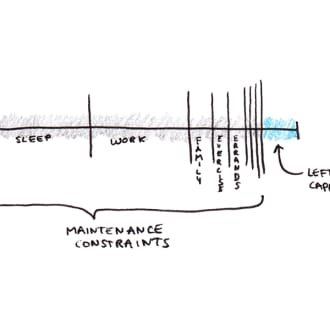
10+ Best Articles on Time
The most useful articles on time from around the web, curated by thought leaders and our community.
Refind focuses on timeless pieces and updates the list whenever new, must-read articles or videos are discovered.
Top 5 Time Articles
At a glance: these are the articles that have been most read, shared, and saved on time by Refind users in 2024 so far.
Videos
Watch a video to get a quick overview.
RESONANCE AND ALIENATION. TWO MODES OF EXPERIENCING TIME?
By Hartmut Rosa for TimeWorld 2019, the International congress on Time.https://timeworldevent.com/1/accueil/Hartmut Rosa is Professor of Sociology and Social...
How to ...?
How to Slow Down Time
As I moved from my twenties to thirties I noticed a certain psychological miscalculation happening more often: a day that feels like it was three or four months
Trending
These links are currently making the rounds on time on Refind.
When Procrastination is Productive
Productivity isn’t throwing out all your existing commitments in the fanatical pursuit of a big ambition. Instead, choosing what matters and organizing your time and energy to reach it.
Short Articles
Short on time? Check out these useful short articles on time—all under 10 minutes.
Our Brains Completely Distort How Time Actually Happens — Here’s How To Take Advantage Of It
Researchers are attempting to understand how our interaction with our environment shapes our experience of time.
«So, when we experience fear, joy, anxiety, or sadness, emotional processing and time processing interact. This results in the sensation of time passing more, speeding up or slowing down. Time really does fly when you’re having fun, and drag when you’re bored.»
Light and Its Relationship to Time
Usually, when we think of subjects like light and time and light and its relationship to time, if we think of them together at all, they seem disparate. Time we associate with something on a clock…
8 Misconceptions of Time That Make You Less Productive
How familiar are you with "time" and "time management"? This article debunks some misconceptions of time so you can better use your time.
Four Thousand Weeks
A tribute to the book by Oliver Burkeman, an exploration of time management in the face of human finitude, and addressing the anxiety of “getting everything done.”
"Time inequality" is the world's real problem, not income inequality
Inequality should be measured in terms of the time it takes for us to earn the money to buy the things we need.
«For every 1% increase in population, personal resource abundance increased by 4% and global resource abundance increased by 8%.»
Long Articles
These are some of the most-read long-form articles on time.
Time is not an illusion. It’s an object with physical size
Not a backdrop, an illusion or an emergent phenomenon, time has a physical size that can be measured in laboratories
The Tyranny Of Time
The clock is a useful social tool, but it is also deeply political: It benefits some, marginalizes others and blinds us from a true understanding of our own bodies and the world around us.
«Clock time is not what most people think it is. It was created, and it is frequently altered and adjusted to fit social and political purposes.»
UTC is Enough for Everyone, Right?
Programming with dates, times, and timezones is hard. But here's some help.
What we get wrong about time
Most of us tend to think of time as linear, absolute and constantly “running out” – but is that really true? And how can we change our perceptions to feel better about its passing?
What is Refind?
Every day Refind picks the most relevant links from around the web for you. Picking only a handful of links means focusing on what’s relevant and useful.
How does Refind curate?
It’s a mix of human and algorithmic curation, following a number of steps:
- We monitor 10k+ sources and 1k+ thought leaders on hundreds of topics—publications, blogs, news sites, newsletters, Substack, Medium, Twitter, etc.
- In addition, our users save links from around the web using our Save buttons and our extensions.
- Our algorithm processes 100k+ new links every day and uses external signals to find the most relevant ones, focusing on timeless pieces.
- Our community of active users gets the most relevant links every day, tailored to their interests. They provide feedback via implicit and explicit signals: open, read, listen, share, mark as read, read later, «More/less like this», etc.
- Our algorithm uses these internal signals to refine the selection.
- In addition, we have expert curators who manually curate niche topics.
The result: lists of the best and most useful articles on hundreds of topics.
How does Refind detect «timeless» pieces?
We focus on pieces with long shelf-lives—not news. We determine «timelessness» via a number of metrics, for example, the consumption pattern of links over time.
How many sources does Refind monitor?
We monitor 10k+ content sources on hundreds of topics—publications, blogs, news sites, newsletters, Substack, Medium, Twitter, etc.
Can I submit a link?
Indirectly, by using Refind and saving links from outside (e.g., via our extensions).
How can I report a problem?
When you’re logged-in, you can flag any link via the «More» (...) menu. You can also report problems via email to hello@refind.com
Who uses Refind?
450k+ smart people start their day with Refind. To learn something new. To get inspired. To move forward. Our apps have a 4.9/5 rating.
Is Refind free?
Yes, it’s free!
How can I sign up?
Head over to our homepage and sign up by email or with your Twitter or Google account.
Keep Learning
Get the big picture on your favorite topics.











